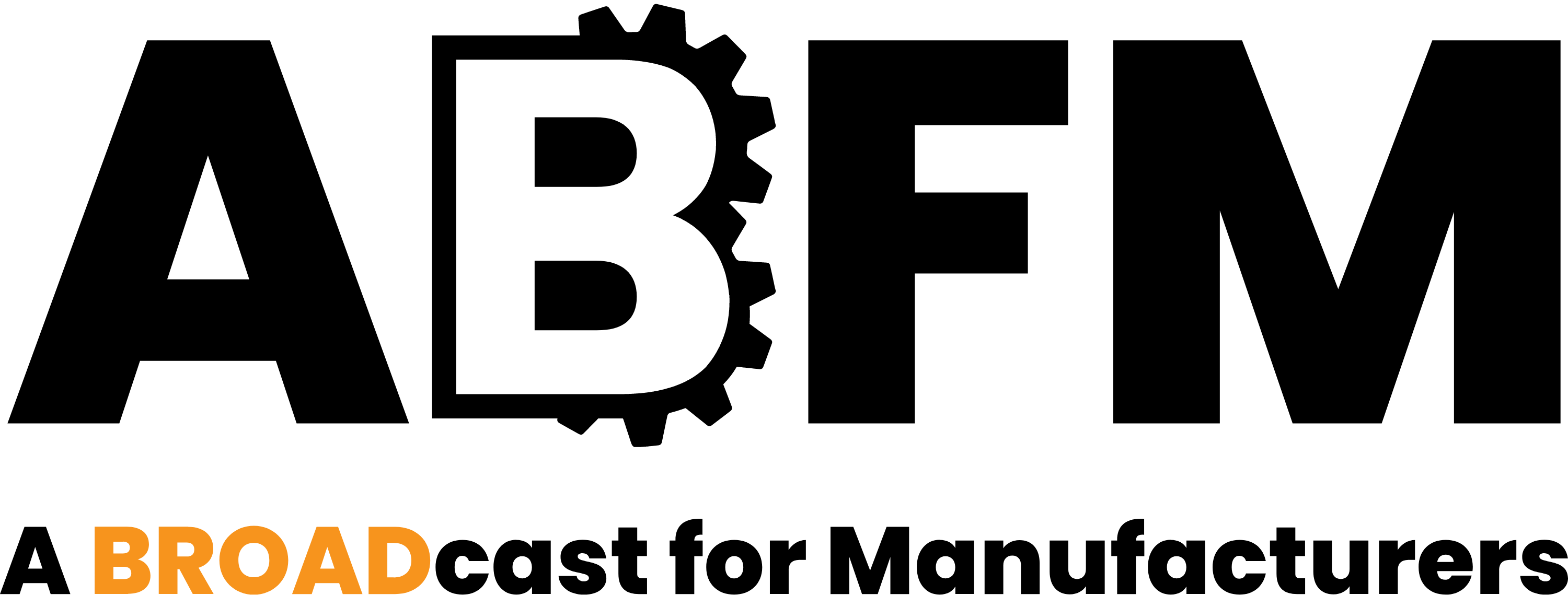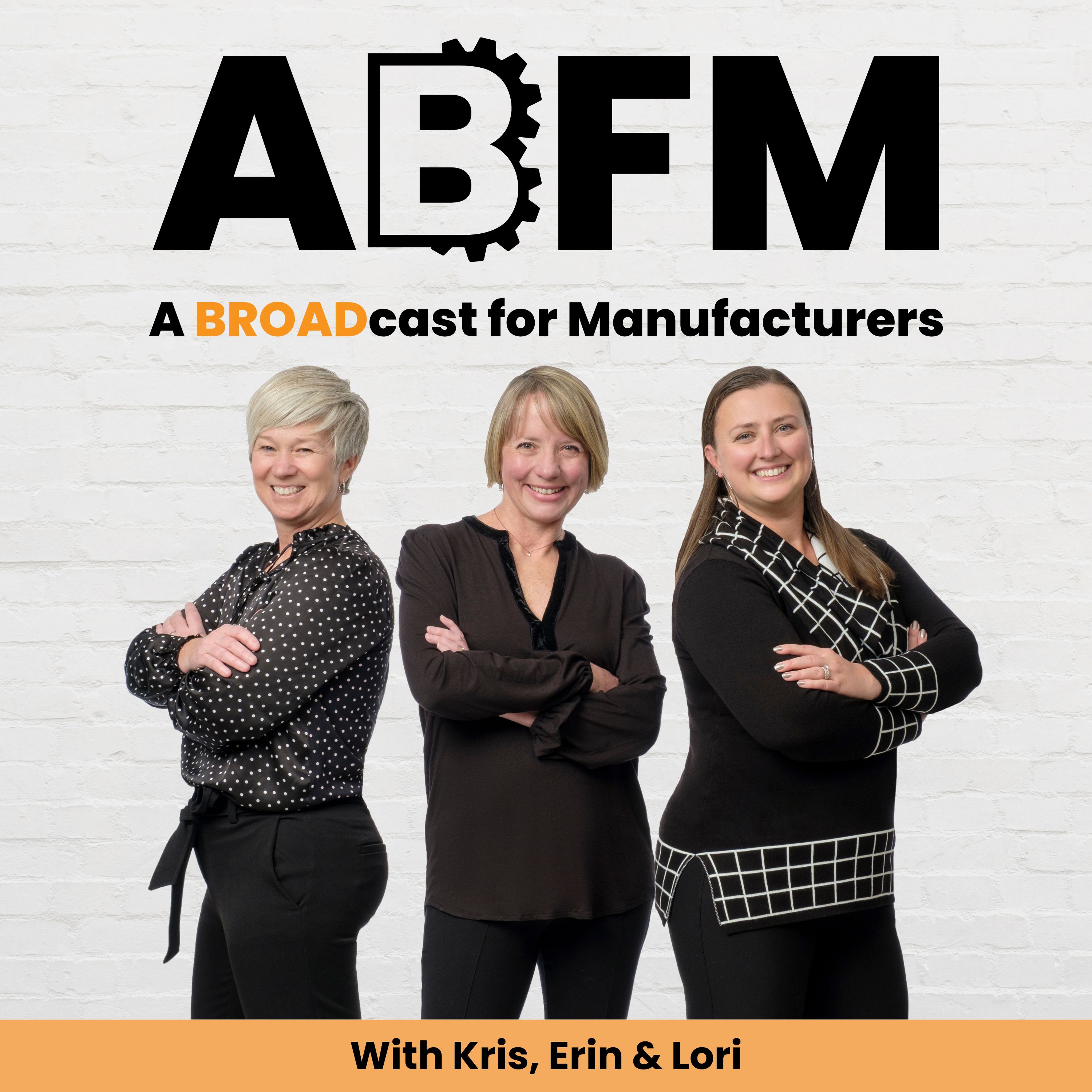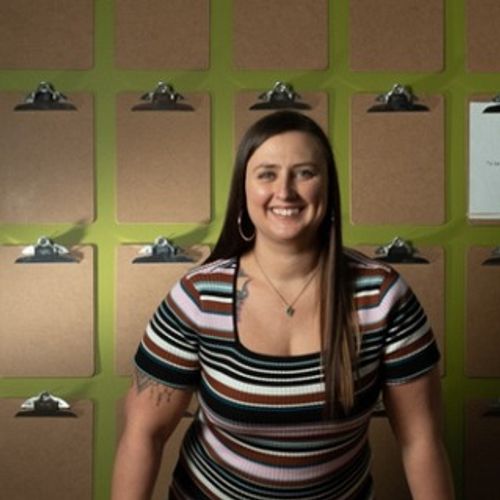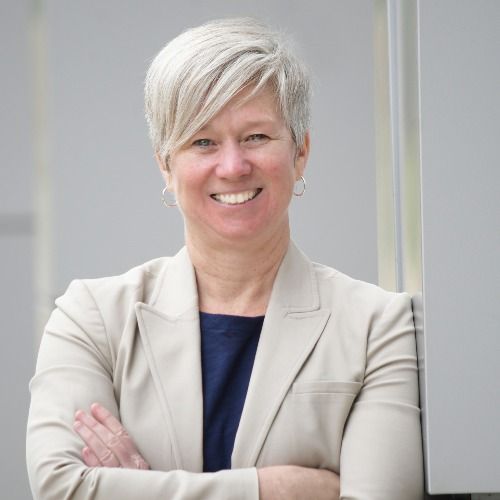Episode 6
06: Women In Manufacturing - with Meaghan Ziemba
Meet Meaghan:
Meaghan is the host of the Mavens of Manufacturing Podcast which celebrates women in manufacturing from the shop floor to the C-suite. She interviews some amazing guests on her show and has been an advocate for women in manufacturing, and has been working to attract people of all ages to the manufacturing industry. She is also the owner and founder of Z-Ink Solutions which is a copywriting and copy editing service that provides impactful text and memorable storytelling for a variety of brands and industries.
Lori: Meaghan, could you just tell us a little bit about yourself?
Meaghan: Yeah, so I thank you again for inviting me to your podcast. I'm really excited for the conversation. And anytime I get to share, you know, news about Mavens or Z-Ink, I get really excited about it because a lot of people know me through mavens, and not so much Z, which is actually the first thing I started before Mavens. So I'm a technical writer by trade. I have a master's and bachelors. I said that backward, but that's okay. A bachelor's and master's degree in professional and technical writing. I am a UWM, which is the University of Wisconsin Milwaukee, alum. So when I left high school, I had no idea what I wanted to do. And I have that typical story where my parents pressured me into going into college. And I always tested well with writing and storytelling, my English teacher, I was the favorite almost always, in all of my English classes. My sister got the math gene, I got the word gene. So it's kind of funny to have us in a room together because she'll spout out numbers and I have no idea what she's talking about. But, um, when I got into college, I was spiraling kind of out of control. And then I ended up getting pregnant with my daughter and decided to move back to Wisconsin I found out about professional and technical writing and my teacher gave us a great assignment on how to make a peanut butter and jelly sandwich. And there were like 12 to 15 students within that class and he went through each of our instructions and had 12 to 15 different end results, which was really interesting. It opened up my eyes to how information is interpreted differently across different people and cultures and even countries. So when I graduated, I started out in the trade publication industry and learned about engineering and manufacturing that way, and it was a lot of fun. And then a lot of different people learned about their passions and why they were in the sector. And I tried to get out of it and go into higher education and do some marketing for higher education but I got really bored out of my mind. So I decided to get back into engineering and manufacturing and work for several companies within their marketing departments. But even with that opportunity, I had a lot of fun, but I really missed getting to know different people in different areas. And I loved going to trade shows because it gave me an opportunity to actually meet different people from different companies and learn their stories. And I tried to take what I learned from them, and apply it to the companies that I worked for, to get people really excited about some of their products and stuff. Because if you're engineering or manufacturing, not everything is really exciting. Some of it is really technical and boring. So you got to find that, that hard string that you can pull for people. So I talked to my husband, and I was like, Hey, do you care if I start my own freelance company, because I feel like that's gonna actually feed into everything that I love doing. I can work with different people at this time, are Simon, my 18-year-old daughter, and then we have two toddlers. And I was like, this way I can pick my hours and I can be home more for them, and not have to leave, I can keep my office at home and be able to do that work-life balance that I've craved so much. He's like, Yeah, go for it. So I started seeing solutions. And I am not like your, I don't want to say typical girl, because I feel like I'm categorizing women in certain ways. And I don't want to do that. But I have tapped us. I used to have a motorcycle. I like doing different things. I like riding motorcycles, and digging in the dirt. So I mean, with how the market is changing, and the some of the challenges that we're experiencing right now, especially with workforce development, and getting people into the sector, you can't really do the same thing that we've done over the years like we have to change it up a bit and really attract the next generation. And how do you do that? You have to talk the way that they talk to you have to act the way that they act. And they're not all alike, they don't really delete any, like profanity or anything from their language. And I'm not saying to fill your marketing stuff with that. But that's where I came up with this, this is not your grandmother's copywriting. Like, I like to be able to share what my client's personality is, through writing, I don't want to take that out, I want to be able to share who they are, and what they're thinking. And that's where I think my superpower is. A lot of people think writing just comes naturally. And it really is a process. If you want to do technical writing or any kind of copywriting or copy editing the right way, you really need to develop a strong trusting relationship with the people that you're writing about. And so it takes me a while to develop these trusting relationships. And sometimes I don't get it right on the first ride, but that's okay. Because we're just getting to know each other. It's like any other relationship that you have. And I really want to show who those people are through the writing. So that's why I just started to have that tagline. It's not your grandmother's writing, because it's not covering up any of their personality. It's letting that shine through. And I think that's one of the differences that I have that makes me unique from other technical writers or other copywriters and editors. I really take the time to build a friendship with my clients because I want to make sure that how they are as an individual comes through the text that I'm writing for them. So that's where that tagline came in. And the way that xe into cells was then was my last name. So that's what the z is and then ink, I-N-K, I was doing a little wordplay so instead of having IMC I did INK. Because you get ink from a pen.
I'm also a mom, and you've talked about being a mom and about just what that means for you and your role. But I'm, I'm curious what, what that means for you, and in bringing your clients' personal voice into the work that you do in the writing that you do, and your mission to bring diversity to manufacturing how that human voice helps accomplish those goals.
Erin: Can you tell us about vulnerability and diversity and how they support one another?
Meaghan: Yeah, so when I was growing up, it was just really strange. For me to see the distinctiveness and how my dad was at home versus how he was at work. It seemed like there were two different people. And I can say that, because I worked with him, which was a very interesting opportunity. But in manufacturing, and engineering, I kind of saw that with a lot of people, like they acted one way in front of certain people. But then when those people weren't around, they acted a different way. And I didn't know if that was necessarily helping them or hurting them. I feel like humans are humans, we make mistakes, and that's okay. But if you really want people to develop a trusting relationship with you, you have to have that transparency, because if you don't, then it comes across as sort of insincere, and, and authentic. And that can really hurt your brand. So I've worked with companies. And, um, unfortunately, I've worked with companies where they updated their core values. And they talked about how important these core values were, because oh, this is who we are as people. But then behind closed doors, they said some things that were very hurtful and demeaning, and not very supportive of some of their employees. And it was really sad to me that that happened. And I think that we have enough challenges going on in the sector, we need to stop that. So I'm a huge advocate for calling that stuff out. And educating people not calling them out in a way where you're insulting them, because I don't think that adds to the conversation. And I don't think heated conversations help people learn. So I read this book called Crucial Conversations. And it is really a helpful book, if you haven't heard it, have initial conversations, Crucial Conversations, the author is escaping my head. But it's such a great book because it really gives you some tips that you can use to diffuse a heated conversation. And it helps you look outside of what your personal story is, and how your emotions connect with your story, to really look at another person's personal experiences, and how to like, kind of adjust that conversation. So it's not so heated. And I think that's important. And, you know, I think it's just fun to see the authenticity from people. I love working with working moms. I feel like we all have something in common when it comes to kids not listening to you, or the girls' things that they do, or the destructive things that they do. It helps you build a network for things that you know, you might have felt alone on, you actually have that connection, and you can grow and move forward. And you can actually, you know, talk to someone else about it. So with some of the guests that I've had, they actually become really good friends with them, which is great. And it's funny because we talk about some of the ridiculous things our kids do. And there was a point in my life for a while where I was like, Man, I'm the only person feeling this way and this is really hard for me. I don't know if I am making the right decision. And I don't know if I can keep going with this because I feel like I'm a bad mom. And then I have other moms who are like, “No, that's completely normal, it's time, just keep going, you'll get over that moment, and it will just make you stronger.” So it's great to have that network. And I think you wouldn't have those opportunities if you stopped being who you truly are, and kind of covered up who your authentic self is.
I think it gives people an opportunity to, like, with work-life, you know, everybody's on a deadline, and like, you have to get this done. And if it doesn't get done at the end of the world, and things come up in life that you can't control. Like, if my kid gets hurt, because he thought jumping off a table is a great idea. You know, it's gonna take some time for me to like, pick him up, bring him to the hospital, if he needs stitches, or if he's sick with the flu or something. Or if my daughter, you know, she got into a car accident, I had to drop everything to go get her. And I don't have time to message people I don't have time to explain, I can only explain it after I know everything's okay with her. So I think allowing people to be humans, gives them that flexibility that they need to balance that work-life balance out, like if things if something doesn't get done tomorrow, I know, in some instances, it needs to get done. But in most instances, it's okay. If it waits. You don't have to get it done right away all the time. So I try to make people understand that, like, if you have something come up, and you need to cancel, or if you miss accidentally because you got distracted, I'm not gonna hold that against you, we can always reschedule and it's, it's okay. Because it happens to me all the time. Like I get distracted by my kids all the time. And I'm just like, I have to reschedule this because my kid is going nuts right now. And he fell off with something and I need to try to give that.
Lori: What are some of the best examples that you've witnessed in the manufacturing space where organizations are actually taking the right actions to create a positive culture around D&I?
Meaghan: So one example I'm going to call the company out right now AI automation is in the automation space, hence their name. But I actually am interviewing Nonna Young, who is the founder of a nonprofit called get girls going. And it's a nonprofit that helps black teen girls gain the leadership skills necessary to be an entrepreneur, and it's across sectors. So it's not just engineering and manufacturing. It's all markets. And I think it's really great. That, you know, I was able to connect with her because of automation. So I do some work for AI automation. They were talking to me about mavens and manufacturing. And they're like, Do you need any more guests because we have some really great women that we could recommend to your show. And nano is one of those women, they had an employee of, I don't know how many years ago, but they had an employee who was working with them who knew not on a personal basis. And that employee came to them. It said, Look, she's trying to get this nonprofit off the ground, can we help her and they actually partnered with this nonprofit, and gave her some legroom in terms of promotional and marketing materials. And they actually donated to her organization. And they're helping her get her feet off the ground, which I think is phenomenal. And I've heard other companies do that as well, too. There's a machine maintenance company called Augury who I interviewed, Artyom is his name. And we were talking about some of the community things that they help support. So with their employees, if they're part of some nonprofit organization outside of where they try to learn about those organizations. And then they themselves try to get involved, whether it's providing sponsorship, donations, funding, or even people to participate in some of the events that they're doing. So like for some of the cancer groups that are out there, they either do like 5k, runs, or walks or they do like food drives and stuff to help raise money for cancer research. They try to get involved with that. And I think showing that you care about other people's interests, and then helping support that, in some way, is really helpful, and showing your surrounding communities that you're willing to do these opportunities to help grow other individuals in a positive way. And those were the two companies that I thought of right away. There are other companies, one individual, Andrew Crowe, is actually a CNC machining instructor in St. Louis, and he's doing this American manufacturing Renaissance store. And he is basically targeting students in urban city areas who might not know what modern manufacturing is, or might not even have the funding to have those classes in those communities. So it's really great to see him get out there. And companies like McMaster came to sponsor such an event. Because without that funding, he wouldn't be able to go from city to city like he's doing to do that. So. So events like that, if you're in manufacturing, and you know the backstory of it, providing sponsorship is a huge way to support di efforts. And I'm trying to do more of that as Maven. So being a startup company myself, I don't have a lot of funds yet to sponsor things like that. But I try to volunteer my time. So with Andrew, I'm trying to help promote it as much as I can. I try to connect them with individuals that I think would add to the tour. I'm going to be reaching out to different cities that I will assign near Chicago, Milwaukee, and St. Louis. I'm going to reach out to my connections there and connect them with him. And then I'm going to look for sponsorships and stuff for him because I think what he's doing is really important. And it's going to take a village and we all need to be proactive. So if any companies out there are listening and you know if events like that are targeting D&I efforts, you know, ask how you can help volunteer time if you don't want to invest money because again, time is just as valuable as money. And if you can, you know, donate a booth or set up a table or even provide speakers, like someone who can talk about the technology or you're creating that that's just as beneficial in my opinion. There's a gentleman named Matt Goosey, who owns a machining shop. And one of his quotes was to put your boots to the ground. So I always use that now, like I'm putting my boots to the ground, and they're gonna do what I can and ask questions and learn what I can. One of the things that I'm doing is I'm actually working with my own community, the high school that I graduated from, I'm trying to get a robotics team started there, and then also get Andrews tour to swing through the city. So that's another thing that I'm working on right now, which I'm excited about. I hope that happens. I don't know. I've never done a robotics team before. So I'm learning as I go with that. So it's interesting.
And so much more…
Connect with Meaghan
Listen to Mavens of Manufacturing!
Connect with the Broads:
Connect with Lori on LinkedIn and visit www.keystoneclick.com for your strategic digital marketing needs!
Connect with Kris on LinkedIn and visit www.genalpha.com for OEM and aftermarket digital solutions!
Connect with Erin on LinkedIn and visit http://www.earthlinginteractive.com for web-based solutions to your complex business problems.




